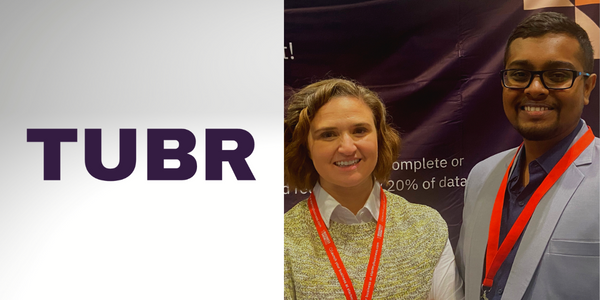
TUBR’s mission is to remove barriers for businesses to access machine learning without requiring in-house data science capabilities, or complete data sets. TUBR offers machine learning as a product service and only requires 20% of the normal data required to make accurate predictions 21 days into the future. We spoke to Co-Founder and CEO Dash Tabor and Noël Kennedy Chief Growth officer to find out more.
What makes TUBR special?
We establish impact factors that determine what companies are trying to predict, and combine this with existing, often incomplete data they have to create predictive models. Decisions based on previous data are not always accurate predictors of future behaviour, particularly when trends are less predictable post-covid. We create more accurate predictions by taking environmental data points that influence factors to create a fuller picture.
How is small data valuable to businesses?
We want to educate the market about what is possible with small amounts of data. There is a trend for companies to start using smaller amounts of data, a Gartner article in 2020-21 said 70% of companies will switch from big data to small and wide data by 2025. 99.5% of data collected is never analysed and around 90% of data is semi-structured, sparse and sporadic. So the theme for the last decade has been collecting data but it’s so big and overwhelming, and post covid historical data is no longer as valuable because trends have changed so drastically. We want to educate people to use small data sets to drive business value.
What is TUBR’s methodology?
Traditional machine learning is based on statistical data, often using years of complete datasets, which is used to create a model. We bring more transparency into what is traditionally a black box, through a physics-based methodology. Our engine sits in front of the machine learning, taking data and deconstructing it, alongside other data sources to understand the impactful constraints of why certain things are happening. It then builds a model based on the ‘why’ and runs the machine learning.
What inspired you to start the business?
I was tired of the commute on the London Underground and because of my background in data product management, I started to think about how all the data in my journey could be used to improve how services run. Everyone traveled in the same data patterns, so what I wanted to do was create a recommendation engine that improved people’s travel based on predictive data. Everyone kept saying you won’t be able to gather enough data, and that the technology doesn’t exist. So with my co-founder , Nikhil Kanta, who has a physics background, we focused on the user case of the London Underground. We ended up with only 6% of the data and worked on this through lockdown when trends were constantly changing. We knew we had to build a technology solution that accommodated chaos, and once we built it we realised we were getting higher accuracies than traditional machine-based learning which sits at around 75% accuracy. Our results were typically sitting at around 80-85% and once we realised what we had built we knew we had to start talking about it in the market.
Who benefits from TUBR’s services?
Our technology works for any business involved in the movement of people or objects, whether it’s SMEs, retail, hospitality, or larger corporations managing workspaces, we can help. When you can make more accurate predictions, you can make more informed decisions, for example, the data gathered from hybrid working patterns can help you think about what spaces people value and how you can create great working environments.
Why did you decide to set up the business in Sheffield?
We knew we wanted to move outside London and were attracted by the start-up community and support in Sheffield. Almost immediately we were able to tap into support with a flurry of introductions and connections. We worked with TEAM SY, North Invest, and Sheffield Tech Parks. There are so many wonderful things working in harmony in Sheffield and it’s been brilliant to be part of these communities.
What are your plans for the future?
In the future, we will continue to advance technology in the small data emerging market by expanding the use cases which are possible with TUBR ML and delivering a no/low code platform that anyone can use to implement machine learning into their products. We plan to continue to grow our team in Sheffield with ambitions of eventually having a heavier focus on other regions across Europe and the United States.
How can people find out more?
You can find out more about TUBR on our website and get in touch to find out how to make the most of your data here.